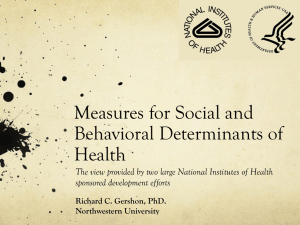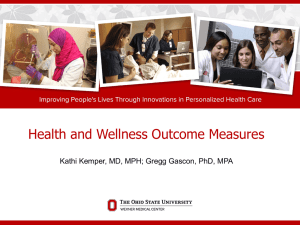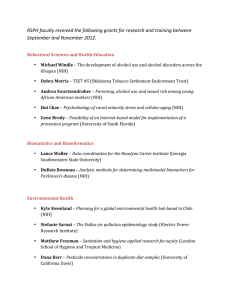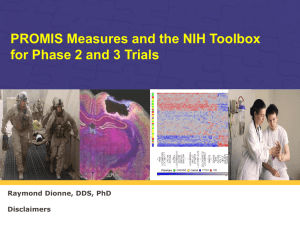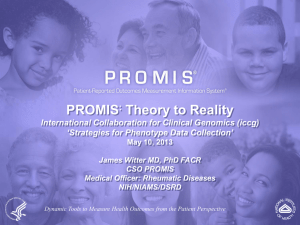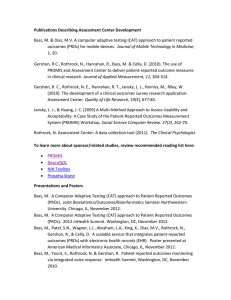Patient-Reported Outcomes Measurement Information System (PROMIS): Opportunities in Health Services Research
advertisement
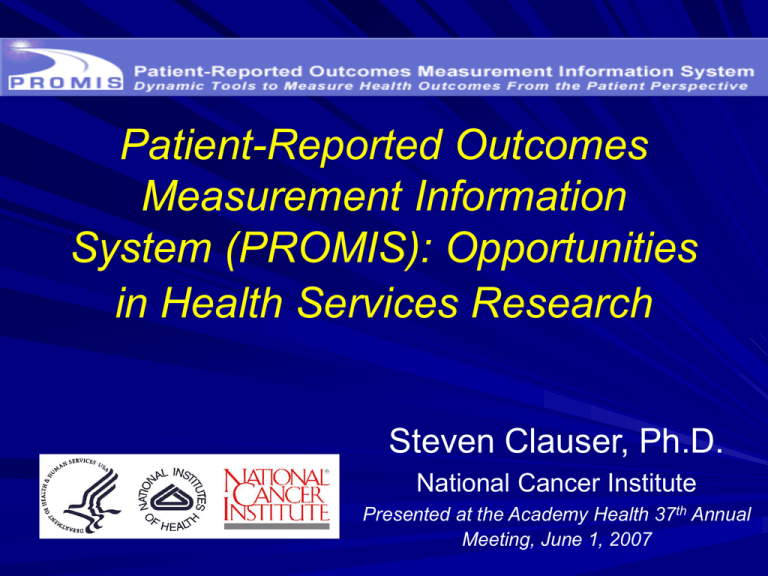
Patient-Reported Outcomes Measurement Information System (PROMIS): Opportunities in Health Services Research Steven Clauser, Ph.D. National Cancer Institute Presented at the Academy Health 37th Annual Meeting, June 1, 2007 TODAY’S AIMS: Describe the NIH Roadmap PROMIS Initiative Explain the PROMIS methods, measures and/or resources of potential interest to health services researchers Explore case studies of how PROMIS research tools can enhance health services research Discuss how you can become involved Why Develop a Trans-NIH “RoadMap” Initiative? Revolutionary and rapid changes in science Increasing breadth of mission and growth Complex organization (27 institutes and centers, multiple program offices) Structured by disease, organ, life stage, disciplines …. Rapid convergence of science What is the NIH Roadmap? A framework of priorities the NIH as a whole must address to optimize its entire research portfolio. – Developed with extensive input from stakeholders, scientists, NIH research staff and providers A vision for a more efficient and productive system of biomedical and behavioral research. A set of initiatives that are central to extending the quality of healthy life for people in this country and around the world. NIH Roadmap for Medical Research New Pathways to Discovery NIH Research Teams of the Future Re-engineering the Clinical Research Enterprise Re-engineering the Clinical Research Enterprise Recast the NIH entire clinical research system – Create new partnerships of research with organized patient communities, community-based health care providers, industry, and academic researchers. – Develop new paradigms in how clinical research information is collected, used, and reported. – Adopt advances in information technology, psychometrics, and qualitative, cognitive, and health survey research. PROMIS RoadMap Goal: • Create highly valid and reliable item banks and associated computerized adaptive testing • Encourage wide adoption to improve assessment of • self-reported symptoms • other health-related quality of life domains • across a wide range of chronic diseases The PROMIS of a better future… A publicly available, adaptable and sustainable Internet-based system that will: 1. Create item banks for precise, valid, and efficient health status assessment via short forms or computer-adaptive testing (CAT) 2. Collect and analyze patients’ responses 3. Provide instant health status reports to users to: Enhance research Improve clinical decision-making Facilitate policy-making by health plan and systems and public programs 4. Support disease-specific research applications as well (e.g., cancer) PROMIS Network ● University of Washington Stony Brook University ● ● University of Evanston/Northwestern ♥ ● NIH Pittsburgh ● Stanford University UNC –Chapel Hill ●● Duke University PROMIS integrates the fields of… Information Technologies Cognitive Aspects of Survey Methods Psychometrics PROMIS Qualitative Research Methods Survey Research PROMIS Domain Framework for PRO Indicator Development Function/Disability Upper Extremities: grip, buttons, etc (dexterity) Lower Extremities: walking, arising, etc (mobility) Central: neck and back (twisting, bending, etc) Activities: IADL (e.g. errands) Physical Health Pain Fatigue Satisfaction Symptoms Sleep/Wake Function** Sexual Function Other Anxiety Selfreported Health Depression Emotional Distress Anger/Aggression Substance Abuse Mental Health Negative Impacts of illness Cognitive Function Positive Impacts of Illness Satisfaction Satisfaction Social Health Satisfaction Positive Psychological Functioning Role Participation Social Support •Self Concept •Stress Response •Spirituality/Meaning •Social Impact Meaning and Coherence (spirituality) Mastery and Control (self-efficacy) Subjective Well-Being (positive affect) Performance Satisfaction PROMIS - Multiple Delivery Platforms Telephone Interview Self Administered Personal Interview Dynamic Assessments TV Hand-held Device Internet Administered Interactive Voice Recognition What is the PROMIS Time Line? 2004-05: Choose specific domains Identify, review instruments and items 2006-07: Build item pools in 5 domains Collect response data Create alpha version of CAT Build collaborative alliances 2008-09: Conduct final calibration process Put CAT into final form Conduct second major network project Feasibility tests and User Group meetings Build sustaining partnerships PROs Importance for HSR Physicians focus largely on technical aspects of care and survival, but are increasingly interested in symptom response and patient functioning Patients focus on survival, quality of life, and experience with care – These factors include health status, functional and emotional status, access, communication, coordination of care, family inclusion, education, respect, and economic burden – Many of these measures can only come from patients’ Patient Reported Outcomes (PROs) Policymakers focus on all domains – treatment efficacy, employee satisfaction, time out of work, reduced disability, overall health and health costs What is the PROMIS Potential for Health Services Research? Enhance national capacity to – evaluate effectiveness of health interventions throughout the care continuum - prevention, diagnosis, treatment, rehabilitation, palliation – monitor progress against burdens of disease – improve doctor-patient communication and decision-making in clinical practice. – support a wide range of studies on the determinants of health care utilization, quality of care, and health outcomes PROMIS Website http://www.nihPROMIS.org/ NIH Program Contact for PROMIS: William (Bill) Riley, PhD Acting Program Director, PROMIS National Institute of Mental Health wiriley@mail.nih.gov NCI Program Contact for Cancer/HSR: Steven Clauser, PhD clausers@mail.nih.gov
